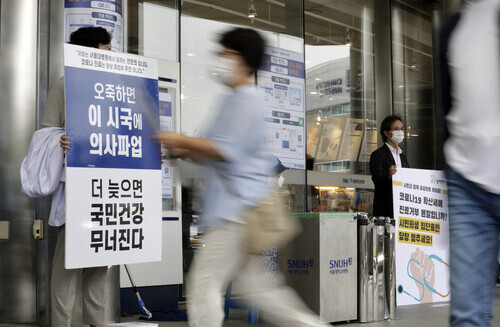hankyoreh
Links to other country sites 다른 나라 사이트 링크
Hospitals on verge of collapse amid COVID-19 resurgence as doctors continue strike

As a strike by residents continued for a 13th straight day amid a resurgence of COVID-19 cases, healthcare institutions find themselves facing not just a treatment vacuum but a situation bordering on a system collapse. Not only has the lack of physicians left nurses having to illegally perform operations and issue prescriptions, but many are also saying the growing fatigue has pushed them to their limits.
When the residents first went on strike on Aug. 21, a crisis was narrowly averted as hospitals put off most of their surgery procedures. But the inability to put off such operations indefinitely has resulted in numerous emergency procedures being scheduled. In some hospitals, the absence of residents has led to a situation where surgery is being performed by professors and physician assistant (PA) nurses.
“It’s been extremely stressful for PA nurses filling in for the residents’ treatment activities, all while knowing that it’s illegal according to the Medical Service Act,” a PA nurse working at a university hospital in the Daegu/North Gyeongsang Province area told the Hankyoreh on Sept. 2. According to this account, nurses are performing duties that are not permitted for them according to the Medical Service Act, including accessing doctors’ prescription records to issue patient prescriptions and drawing arterial blood.
Severe fatigue has also been mounting as the strike drags on. The same nurse said, “Not only have I had to cancel my scheduled vacation in mid-August and put in overtime hours, but I keep getting called in to work on days when I’m not scheduled to work as emergency patients come in.”
Amid the recent rise in the number of coronavirus patients requiring intensive care, the situation has been even more serious for the hospitals caring for them. Boramae Medical Center in Seoul has been designated by the state as a dedicated hospital for coronavirus patients. But with residents on strike, it is facing a shortage of staff to care for patients, as well as a dangerous system in which patients with mild symptoms are treated in the same settings as the growing number of intensive care patients.
In a statement on Sept. 2, the healthcare solidarity headquarters of the Korean Public Service and Transport Workers’ Union (KPTU, affiliated with the Korean Confederation of Trade Unions) said, “A single nurse cannot handle any more than one intensive care patient, but at Boramae Medical Center we’re seeing a situation where a single nurse is in charge of three intensive care patients and one mild patient.”
Another nurse who works in the medical center’s isolation ward said, “The number of intensive care patients has continued to rise with the sharp increase in severe cases recently, but the residents are not coming back and additional nursing staff have not been brought in.”
“The fatigue among staff here has reached critical levels,” the nurse said.
In an earlier statement, the Korean Nurses Association said, “As they have substituted for duties in healthcare settings where residents and other physicians have walked out, PA nurses have even been assuming some treatment duties that are illegal.”
“The physicians need to call off their strike immediately, and healthcare workers must all work together to overcome the resurgence of COVID-19” the statement urged.
By Lee Jae-ho, staff reporter
Please direct comments or questions to [english@hani.co.kr]

Editorial・opinion
![[Column] Tariffs on China: Trump was dumb, Biden dumber [Column] Tariffs on China: Trump was dumb, Biden dumber](https://flexible.img.hani.co.kr/flexible/normal/500/300/imgdb/original/2024/0520/191716191153918.jpg) [Column] Tariffs on China: Trump was dumb, Biden dumber
[Column] Tariffs on China: Trump was dumb, Biden dumber![[Column] What if Seoul took reunification by force off the table? [Column] What if Seoul took reunification by force off the table?](https://flexible.img.hani.co.kr/flexible/normal/500/300/imgdb/original/2024/0520/3017161928630494.jpg) [Column] What if Seoul took reunification by force off the table?
[Column] What if Seoul took reunification by force off the table?- [Editorial] Intensifying US-China rivalry means Seoul must address uncertainty with Beijing sooner than later
- [Column] When ‘fairness’ means hate and violence
- [Editorial] Yoon must stop abusing authority to shield himself from investigation
- [Column] US troop withdrawal from Korea could be the Acheson Line all over
- [Column] How to win back readers who’ve turned to YouTube for news
- [Column] Welcome to the president’s pity party
- [Editorial] Korea must respond firmly to Japan’s attempt to usurp Line
- [Editorial] Transfers of prosecutors investigating Korea’s first lady send chilling message
Most viewed articles
- 1New doc undoes stereotypes of N. Korea with candid portraits of women’s football legends
- 2Is growing Korean investment in the US a win-win for both countries?
- 3[Reporter’s notebook] In Min’s world, she’s the artist — and NewJeans is her art
- 4To weigh costs and benefits, Korea must stop treating US troop presence as a sacred cow
- 5[Column] What if Seoul took reunification by force off the table?
- 63 months into doctors strike, finding an emergency room in Korea is harder than ever
- 788% of Chinese firms would rather work with Korean partners than Japanese ones, survey finds
- 8US calls Jeju April 3 Incident a ‘terrible tragedy’ in first statement on bloody history
- 9Kim Jong-un wanted to meet with residents of shelled Yeonpyeong Island in South, Moon recalls in mem
- 10Ted Chiang among top thinkers on AI to speak at Hankyoreh Human & Digital Forum